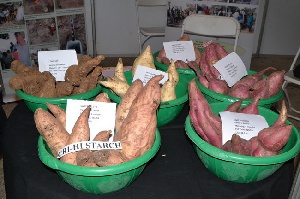Rural poor farmer-based organisations in the Volta, Central and Northern Regions are bemoaning the lack of support shown by financial institutions in the cultivation of orange-fleshed sweet potato, despite its potential to help alleviate extreme poverty.
Emmanuel Darkey, Chief Executive Officer of E. Darkey & Associates Limited -- which is into commercial production of orange-fleshed sweet potatoes, said although it has been able to rally farmers of the crop, getting funds for them remains a challenge.
“The most challenging thing about potato farming is the funding. Banks do not give loans for such developmental projects. However, we need support from the financial institutions to be able to support these poor and vulnerable farmers,” Mr. Darkey said.
According to him, the most interesting thing about sweet potato farming is that an acre of farm should yield a minimum of ten tonnes.
“Currently, we are buying from the farms now at GH¢1 per kilo, which means the farmer earns at least GH¢10,000 per acre. And if you take away cost of operation, which is about 3,000, that’s a cool GH¢7,000 per acre.”
Speaking to the B&FT on the sidelines of an event jointly organised by Farm Radio International and the Editors Forum, Ghana, Mr. Darkey said securing funding for farmers will help provide sufficient nutritional support to more than 40 million children who suffer from Vitamin A deficiency.
The orange-fleshed sweet potato is a variety of potato that is rich in beta carotene and Vitamin A.
Sixty percent of children under six in Ghana are estimated to suffer from sub-clinical Vitamin A deficiency, putting them at greater risk of measles, respiratory and diarrheal infections, decreased growth and slow bone development, and decreased likelihood of survival from serious illness.
Speaking at the event last week, Ben Fiafor -- Farm Radio International’s (FRI) Country Director -- said that realising the usefulness of the Vitamin A sweet potatoes provide, FRI approached the Bill and Melinda Gates Foundation, Helen Keller International, International Potato Centre, and the Sweet Potato Action for Security and Health in Africa (SASHA) to carry out an initiative for fighting Vitamin A deficiency with the crop.
The project has seen FRI distribute over two million cartons of vines in the Central, Volta and Upper East Regions to farmers.
The project was carried out with support from the Ministry of Food and Agriculture, and an advisory group of representatives from various institutions: such as the University of Development Studies, Kwame Nkrumah University of Science and Technology, Women in Agricultural Development and the Ghana Health Service.
After two years the project has achieved 360 hours of information on nutrition and health broadcast in local languages, in addition to distribution of vines for planting.
Business News of Wednesday, 7 October 2015
Source: B&FT

















